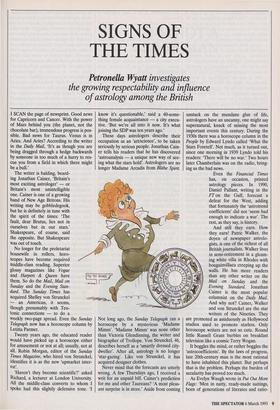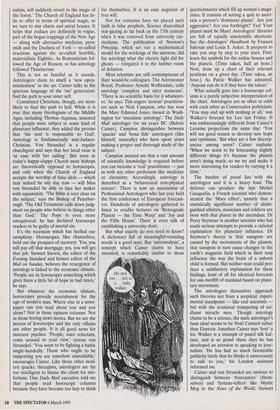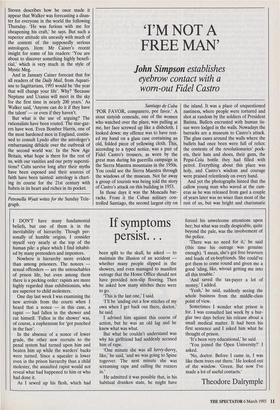SIGNS OF THE TIMES
Petronella Wyatt investigates
the growing respectability and influence of astrology among the British
I SCAN the page of newsprint. Good news for Capricorn and Cancer. With the power of Mars behind you (the planet, not the chocolate bar), tremendous progress is pos- sible. Bad news for Taurus. Venus is in Aries. And Aries? According to the writer in the Daily Mail, 'It's as though you are being dragged through a hedge backwards by someone in too much of a hurry to res- cue you from a field in which there might be a bull.'
The writer is balding, beard- ing Jonathan Cainer, 'Britain's most exciting astrologer' — or Britain's most unintelligible one. Cainer is one of a growing band of New Age Britons. His writing may be gobbledegook, but he is definitely in tune with the spirit of the times: 'The fault, dear Brutus, lies not in ourselves but in our stars.' Shakespeare, of course, said the opposite. But Shakespeare was out of touch.
No longer for the proletariat housewife in rollers, horo- scopes have become required middle-class reading. Superior glossy magazines like Vogue and Harpers & Queen have them. So do the Mail, Mail on Sunday and the Evening Stan- dard. The Sunday Times has acquired Shelley von Strunckel — an American, it seems, though presumably with Teu- tonic connections — to do a weekly two-page spread. Even the Sunday Telegraph now has a horoscope column by Letitia Parmer.
Twenty years ago, the educated reader would have picked up a horoscope either for amusement or not at all; usually, not at all. Robin Morgan, editor of the Sunday Times Magazine, who hired von Strunckel, Identifies it is as the new 'upmarket inter- est', 'Haven't they become scientific?' asked Richard, a lecturer at London University. All the middle-class converts to whom I Spoke had this slightly defensive tone. 'I know it's questionable,' said a 40-some- thing female acquaintance — a city execu- tive. 'But we're all into it now. It's what joining the SDP was ten years ago.'
These days astrologers describe their occupation as an 'art/science', to be taken seriously by serious people. Jonathan Cain- er tells his readers that he has discovered 'astroanalysis — a unique new way of see- ing what the stars hold'. Astrologers are no longer Madame Arcadis from Blithe Spirit.
Not long ago, the Sunday Telegraph ran a horoscope by a mysterious 'Madame Mimm'. 'Madame Mimm' was none other than Victoria Glendinning, the writer and biographer of Trollope. Von Strunckel, 46, describes herself as a 'smartly dressed city- dweller'. After all, astrology is no longer 'star-gazing'. Like von Strunckel, it has acquired designer clothes.
Never mind that the forecasts are utterly wrong. A few Thursdays ago, I received a writ for an unpaid bill. Cainer's prediction for me and other Taureans? 'A most pleas- ant surprise is in store.' Aside from coming unstuck on the mundane glue of life, astrologers have an uncanny, one might say supernatural, knack of missing the most important events this century. During the 1930s there was a horoscope column in the People by Edward Lyndo called 'What the Stars Foretell'. Not much, as it turned out, since one morning in 1939 Lyndo told his readers: 'There will be no war.' Two hours later Chamberlain was on the radio, bring- ing us the bad news.
Even the Financial Times has, on occasion, printed astrology pieces. In 1990, Daniel Pallant, writing in the FT on the Gulf, forecast a defeat for the West, adding that fortunately the 'astrotrend coefficients' did not 'seem bad enough to indicate a war'. The rest, as they say, is history.
And still they earn. How they earn! Patric Walker, the doyen of newspaper astrolo- gists, is one of the richest of all British journalists. Walker lives in semi-retirement in a gleam- ing white villa in Rhodes with bougainvillaea creeping up the walls. He has more readers than any other writer on the Mail on Sunday and the Evening Standard. Jonathan Cainer is the most popular columnist on the Daily Mail. And why not? Cainer, Walker and von Strunckel are the star writers of the Nineties. They are promoted as assiduously as Hollywood studios used to promote starlets. Only horoscope writers are not so cute. Round little Russell Grant burbles on breakfast television like a cosmic Terry Wogan.
It boggles the mind, or rather boggles the 'astrocoefficients'. By the laws of progress, late 20th-century man is the most rational to have inhabited this planet. But perhaps that is the problem. Perhaps the burden of secularity has proved too much.
As Evelyn Waugh wrote in Put Out More Flags: 'Men in natty, ready-made suitings, born of generations of literates and ratio- nalists, will suddenly revert to the magic of the forest.' The Church of England has lit- tle to offer in terms of spiritual magic, so we turn to star charts and astral houses. It helps that zodiacs are definitely in vogue, part of the bogus trappings of the New Age — along with alternative medicine, pyra- mids and the Duchess of York — so-called reactions against the so-called horrible, materialistic Eighties. As Romanticism fol- lowed the Age of Reason, so has astrology followed Thatcherism.
This is not so fanciful as it sounds. Astrologers claim to smell a 'new open- mindedness' in the air. Cainer talks in the spurious language of the 'me' generation: find the path to your inner self.
Committed Christians, though, are more likely to find the path to hell. While it is true that many theologians of the Middle Ages, including Thomas Aquinas, assumed that people were subject to some kind of planetary influence, they added the proviso that 'the soul is responsible to God'. Astrology is fUndamentally anti-Judaeo- Christian. Von Strunckel is a regular churchgoer and says that her local vicar is 'at ease with her calling'. But even in today's happy-clappy Church most bishops are theoretically opposed to horoscopes, and only when the Church of England accepts the worship of false idols — which may indeed be any day now — will Miss von Strunckel be able to face her maker with equanimity. 'The Bible is very clear on the subject,' says the Bishop of Peterbor- ough. 'The Old Testament calls down judg- ment on people who believe in things other than God.' The Pope is even more unequivocal: he has declared horoscope readers to be guilty of mortal sin.
It's the recession which has fuelled our complicity. Horoscopes, like chancellors, hold out the prospect of recovery. Yes, you will pay off that mortgage; yes, you will get that job. Stewart Steven, the editor of the Evening Standard and former editor of the Mail on Sunday, believes the resurgence of astrology is linked to the economic climate. 'People see in horoscopes something which gives them a little bit of hope in bad times,' he says.
But whatever the economic climate, horoscopes provide nourishment for the ego of modern man. Where else in a news- paper can you read about you and you alone? Not in those opinion columns. Not in those boring news stories. But we are the heroes of horoscopes and the only villains are other people. It is all good news for insecure psyches. 'People, once reluctant, come around to your view,' croons von Strunckel. 'You seem to be fighting a battle single-handedly. Those who ought to be supporting you are somehow unavailable,' encourages Cainer. Like those other mod- ern quacks, therapists, astrologers are far too intelligent to blame the client for mis- fortune. One Daily Mail executive told me that people read horoscope columns because they have become too lazy to think for themselves. It is an easy negation of free will.
Not for centuries have we placed such faith in false prophets. Science discredited star-gazing as far back as the 17th century when it was removed from university cur- riculums. The publication of Newton's Principia, which set out a mathematical model for the workings of the universe, did for astrology what the electric light did for ghosts — relegated it to the lumber room of delusion.
Most scientists are still contemptuous of their would-be colleagues. The Astronomer Royal, Professor Arnold Wolfendale, calls astrology 'complete and utter nonsense'. 'There is no scientific basis for it whatsoev- er,' he says. This angers 'serious' practition- ers such as Nick Campion, who has won the Marc Edmund Jones Award in Wash- ington for 'mundane astrology'. The Daily Mail astrologer for six years BC (Before Cainer), Campion distinguishes between 'quacks' and 'bona fide' astrologers (like himself, naturally) who have spent years making a proper and thorough study of the subject.
Campion assured me that a vast amount of scientific knowledge is required before you can become a 'real' practitioner — just as with any other profession like medicine or chemistry. Accordingly, astrology is described as a 'behavioural non-physical science'. There is now an association of Professional Astrologers who last year held the first conference of European forecast- ers. Hundreds of astrologers gathered to listen to erudite lectures on 'Retrograde Planets — the Time Warp' and `Joy and the Fifth House'. There is even talk of establishing a university chair.
But what exactly do you need to know? A dictionary full of meaningful-sounding words is a good start. But `astroanalysis', a concept which Cainer claims to have invented, is remarkably similar to those questionnaires which fill up women's maga- zines. It consists of setting a quiz to ascer- tain a person's 'dominant planet'. Are you aggressive? Are you forthright? Yes! Your planet must be Mars! Astrologers' libraries are full of equally unscientific shortcuts. See the Astrologers' Handbook by Frances Sakoian and Louis S. Acker. It purports to take you step by step to your stars. First, learn the symbols for the zodiac houses and the planets. (Time taken, half an hour.) Next, draw up a chart of their relevant positions on a given day. (Time taken, an hour.) As Patric Walker has admitted, 'Anyone can do it if they have the talent.'
What actually goes into a horoscope col- umn is a purely subjective interpretation of the chart. Astrologers are as often at odds with each other as Conservative politicians. 'You may end up with nothing at all,' was Walker's forecast for Leo last Friday. It was embarrassingly different from Cainer's Leonine projections the same day: 'You will see good reason to develop new hope and optimism.' But what are a few discrep- ancies among seers? Cainer explains: 'When we seem to be forecasting slightly different things it's because the planets aren't doing much, so we try and make it more interesting for readers by varying it a little.'
The burden of proof lies with the astrologers and it is a heavy load. The defence can produce the late Michel Gauquelin, a French scientist who demon- strated the 'Mars effect', namely that a statistically significant number of distin- guished athletes, musicians and soldiers are born with that planet in the ascendant. Dr Percy Seymour is another scientist who has made serious attempts to provide a rational explanation for planetary influence. Dr Seymour's theory is that sunspots are caused by the movements of the planets, that sunspots in turn cause changes in the earth's magnetic field which in their turn influence the way the brain of a unborn child is formed. But neither man could pro- duce a satisfactory explanation for these findings, least of all for identical forecasts for one-twelfth of mankind based on plane- tary movement.
The astrologers themselves approach such theories not from a sceptical, experi- mental standpoint — like real scientists — but with the irrational trumpeting of soi- disant miracle men. Though astrology claims to be a science, the male astrologer's beau ideal seems to be Noel Coward rather than Einstein. Jonathan Cainer says 'love' a lot. Walker is a triumph of pastel silk kaf- tans, and is so grand these days he has developed an aversion to speaking to jour- nalists. 'He has had so much favourable publicity lately that he thinks it unnecessary to talk to you,' his London assistant informed me.
Cainer and von Strunckel are anxious to distinguish between 'forecasters' (them- selves) and 'fortune-tellers' like Mystic Meg in the News of the World. Stewart Steven describes how he once made it appear that Walker was forecasting a disas- ter for everyone in the world the following Thursday. 'He was furious with me for cheapening his craft,' he says. But such a superior attitude sits uneasily with much of the content of the supposedly serious astrologers. Item: Mr Cainer's recent insight for some of his readers: 'You are about to discover something highly benefi- cial,' which is very much in the style of Mystic Meg.
And in January Cainer forecast that for all readers of the Daily Mail, from Aquari- ans to Sagittarians, 1993 would be 'the year that will change your life'. Why? 'Because Neptune and Uranus will meet in the sky for the first time in nearly 200 years.' As Walker said, 'Anyone can do it if they have the talent' — or even if they haven't.
But what is the use of arguing? The rationalists have been routed. The star-gaz- ers have won. Even Bomber Harris, one of the most hardened men in England, contin- ued to consult Lyndo after the astrologer's embarrassing debacle over the outbreak of the second world war. In the New Age Britain, what hope is there for the rest of us, with our vanities and our petty supersti- tions? Cults survive long after their myths have been exposed and their sources of faith have been tainted: astrology is chart- ing its course for the 21st century with hubris in its heart and riches in its pocket.
Petronella 0*a writes for the Sunday Tele- graph.




















































 Previous page
Previous page